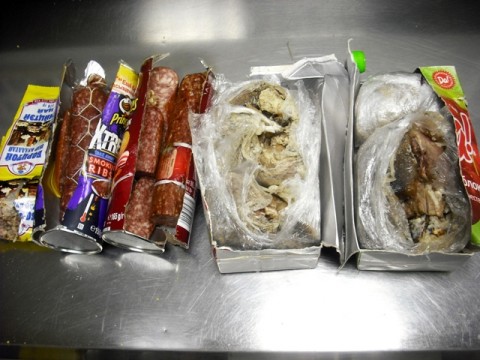OFFICERS FINE PASSENGERS FOR ATTEMPTING TO CONCEAL AGRICULTURE PRODUCTS AT DULLES AIRPORT
U.S. Customs and Border Protection caught three passengers recently attempting to conceal prohibited agriculture products while entering the United States.
The first, a passenger who arrived at Washington Dulles International Airport on Sept. 18 on a flight from Mongolia, tried to conceal 12 pounds of raw beef and pork sausage inside juice boxes and other food containers, according to CPB officers. He was given a $200 fine.
On the same day a passenger from Cameroon “failed to honestly declare” beef weighing 4 pounds and 6 ounces that agriculture specialists found inside her luggage. She was given a $300 penalty.
On Sept. 19, another passenger, arriving at Baltimore Washington International Airport from Jamaica, attempted to concealed four guavas inside the lining of a purse inside her baggage and two peppers inside the liner of her suitcase. She was fined $200.
According to CPB, fruit are potential vectors for invasive insect pests and fruit disease that could cripple America’s crop industries. CPB enforces the U.S. Department of Agriculture’s regulations governing the import of animal products to reduce the risk of introducing exotic animal diseases into the U.S.
“It is very alarming that passengers are taking extreme efforts to conceal agriculture products that should be declared during the Customs and Border Protection arrivals inspection,” Michael Lovejoy, director, CBP Baltimore Field Office said in a prepared statement. “These are very serious threats because of the potentially severe agriculture and economic consequences that plant and animal diseases pose. Customs and Border Protection agriculture specialists take their job of protecting America’s agriculture very seriously.”
CBP uses several tactics to ensure passengers comply with U.S. agriculture laws, including declaration forms, detector dogs, X-rays and hands on searches.
“Generally, most passengers are honest law-abiding travelers who truthfully declare all agriculture and other products they are bringing to the U.S.,” Lovejoy said “But there is a small percentage of travelers who deliberately attempt to circumvent our compliance inspections. All it takes is one diseased fruit or meat product introduced into our crop or livestock industries and we have the potential for an economic crisis. It is our job to stop those potential threats at our nation’s borders.”
During fiscal 2011, which spans from Oct. 1, 2010 to Sept. 30, 2011, CBP agriculture specialists at Washington Dulles seized more than 30,000 prohibited agriculture products and assessed 234 civil penalties. At BWI, more than 4,000 prohibited agriculture products were seized and 17 civil penalties were assessed.
The first, a passenger who arrived at Washington Dulles International Airport on Sept. 18 on a flight from Mongolia, tried to conceal 12 pounds of raw beef and pork sausage inside juice boxes and other food containers, according to CPB officers. He was given a $200 fine.
On the same day a passenger from Cameroon “failed to honestly declare” beef weighing 4 pounds and 6 ounces that agriculture specialists found inside her luggage. She was given a $300 penalty.
On Sept. 19, another passenger, arriving at Baltimore Washington International Airport from Jamaica, attempted to concealed four guavas inside the lining of a purse inside her baggage and two peppers inside the liner of her suitcase. She was fined $200.
According to CPB, fruit are potential vectors for invasive insect pests and fruit disease that could cripple America’s crop industries. CPB enforces the U.S. Department of Agriculture’s regulations governing the import of animal products to reduce the risk of introducing exotic animal diseases into the U.S.
“It is very alarming that passengers are taking extreme efforts to conceal agriculture products that should be declared during the Customs and Border Protection arrivals inspection,” Michael Lovejoy, director, CBP Baltimore Field Office said in a prepared statement. “These are very serious threats because of the potentially severe agriculture and economic consequences that plant and animal diseases pose. Customs and Border Protection agriculture specialists take their job of protecting America’s agriculture very seriously.”
CBP uses several tactics to ensure passengers comply with U.S. agriculture laws, including declaration forms, detector dogs, X-rays and hands on searches.
“Generally, most passengers are honest law-abiding travelers who truthfully declare all agriculture and other products they are bringing to the U.S.,” Lovejoy said “But there is a small percentage of travelers who deliberately attempt to circumvent our compliance inspections. All it takes is one diseased fruit or meat product introduced into our crop or livestock industries and we have the potential for an economic crisis. It is our job to stop those potential threats at our nation’s borders.”
During fiscal 2011, which spans from Oct. 1, 2010 to Sept. 30, 2011, CBP agriculture specialists at Washington Dulles seized more than 30,000 prohibited agriculture products and assessed 234 civil penalties. At BWI, more than 4,000 prohibited agriculture products were seized and 17 civil penalties were assessed.

Comments
Post a Comment